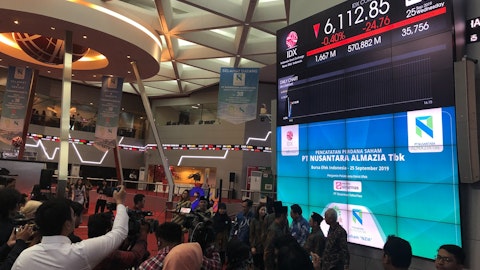Tim Chiang: Hi, thanks. Craig, could you talk just a little bit more about the CrossLink reps that you’ve trained? I think you said over 200. And you mentioned three specific states that you’ve penetrated into. What other states do you plan to be in this summer? And then how many cross linked reps do you plan to have fully trained by the fall?
Craig Collard: Yes. So Tim, thanks for the question. Again, we’ve been extremely pleased with CrossLink. Again, I use the word amazing on my comments, but the relationships that I think these guys bring are just a little different than what we have as a pharma company. And keep in mind that in a lot of cases, CrossLink has been around four years and a lot of the reps have 10, 15, 20 years’ experience with these physicians and being with them every day. So it’s just a different relationship. And so it allows us to get in front of these folks, it allows us to have more time to explain some of the situations with ZYNRELEF and so forth. And so as we’ve mentioned, it frees up time for our reps and that type of thing. But from a training perspective, again, we’ve been moving fairly quickly.
I want to turn it over to David Barozzino. He’s been directly involved and again has been at these training meetings and give you a little more insight into kind of exactly what’s going on and where we’re going next.
David Barozzino: Yes. Thank you, Craig. So Tim, thank you for the question. As it pertains to CrossLink, yes, obviously, we started in the legacy states where CrossLink is present, which is North Carolina, South Carolina, Georgia. But one of the things that is ongoing and it’s ever changing is that on a weekly basis we’re conducting two to three live trainings across the country. The goal by the end of 2024 is to have a presence in each state. I can tell you that we’ve already expanded into areas like Michigan, St. Luis, Kansas and it continues to evolve as from week-to-week. But by the end of the year, we definitely hope to have coverage in all 50 states.
Tim Chiang: Well, that’s great. And maybe just one question. I seem to recall that Florida is a pretty big state for procedures. I mean, are you guys going to penetrate that state near term?
David Barozzino: Yes, 100%. We — that is definitely a focal point. I think you could lump like New York, Florida, Texas, California as four big states. And we are in active discussions with some distributors down there as well.
Tim Chiang: Okay, super. Very helpful. Thanks.
Craig Collard: Thanks, Tim.
Operator: Your next question comes from the line of Kelly Hsieh with Jefferies. Please go ahead.
Unidentified Analyst: Hi, good morning. This is Claire on for Kelly. Congrats on the quarter and thanks for taking my question. So for ZYNRELEF, could you please talk about your qualification for the No Pay Act in the context of your path through status and how the coverage is going to change after it takes effect in 2025? And whether you could give any color of what’s the latest discussion of no paying tax possibility that it will go beyond 2027? Thank you.
Kevin Warner: Yes. This is Kevin Warner again. Thanks for that question. So No Pain Act is coming into effect Q1 of 2025 and it’s going to provide reimbursement outside of the surgical bundle for our HOPD patients, our outpatient procedure department in the hospital and our ASCs for these non-opioids that have been proven to reduce opioid consumption. So right now, ZYNRELEF has passed through as you alluded to and that expires Q1 of 2025. So No Pain Act goes into effect starting Q1. We’ve already had conversations with CMS, very productive conversation, highlighted all the criteria to qualify for the No Pain Act, which generally qualifies for all of those criteria except one. And that one is the fact that we have pass through status.
So that’s why we’ve had this open dialogue make sure that we don’t to fall off in that interim period. And we’re confident that they’ll pick it up and pass it through rate on there won’t be any get passed through status and make sure institutions still have access and reimbursement for ZYNRELEF. As far as extending the duration, No Pain Act was originally designed to be a five year act. Unfortunately it took some time to get pass through Congress, so a little later than desired. But as of right now through the end of ’27, it’s expected. We definitely have a lot of encouragement and support from our community. And obviously, the opioid epidemic concerns of that. We expect them to continue to extend and provide payment for these non-opioids for our country and for our patients.
Unidentified Analyst: Super helpful. Thank you.
Operator: That concludes our Q&A session. I will now turn the conference back over to Craig Collard, Chief Executive Officer for closing remarks.
Craig Collard: Yes, I just want to thank everyone again for listening today, and we look forward to speaking to everyone next quarter. Thank you.
Operator: Ladies and gentlemen, that concludes today’s call. Thank you all for joining. You may now disconnect.
Follow Heron Therapeutics Inc. (NASDAQ:HRTX)
Follow Heron Therapeutics Inc. (NASDAQ:HRTX)
Receive real-time insider trading and news alerts




